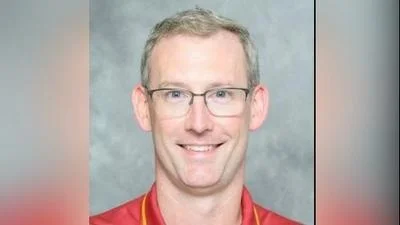Story County Hospital recently issued the following announcement.
Former NFL quarterback Neil Graff figures he’s thrown about a million footballs over the course of his life, so it made sense that he’d eventually run into problems with his right shoulder.
It was originally the kind of discomfort he learned to live with, but that pain progressed beyond that category in the last year. A sore shoulder that acts up occasionally is one thing; a shoulder that wakes you up at night and prohibits you from doing all the things you used to do is another.
In response, Graff has become a participant in a Sanford Health clinical trial known as ENDURE, which is exploring the potential of orthobiologics and regenerative medicine.
Football injuries add up
“I had numerous injuries while I was playing, and as I aged, the cumulative effect of those injuries affected my quality of life,” said Graff, a member of the South Dakota Sports Hall of Fame who played in the NFL from 1972-78. “I’ve had both knees replaced because of football injuries, so I understand that these things can come up as you get older.”
Learn more: Orthopedics regenerative medicine at Sanford Health
Orthobiologics refers to the use of biological substances found in the body to help treat cartilage and tendon issues. Essentially, regenerative medicine taps into the body’s natural healing ability. This may include injuries to muscles, tendons, ligaments and — in Graff’s case specifically — cartilage damage inside his shoulder joint.
About three years ago Graff, a former star at the University of Wisconsin who started 33 consecutive games for the Badgers, discovered he had advanced arthritis in his right shoulder. The symptoms were manageable until the pain started getting in the way of his swimming, yoga, golf and even his sleep about a year ago.
Regenerative medicine as nonsurgical option
This was a 71-year-old who had endured a pair of knee-replacement surgeries and had not slowed down. His shoulder pain, however, had reached the point where it was forcing him to cut back drastically on his physical activities. It was not how he wanted to go through life.
“I contemplated surgery but a lot of my NFL peers had either bad or mediocre experiences with the shoulder surgery I was going to need,” Graff said. “And the recuperative time for shoulder surgery is quite long.”
Another part of the conversations with former players involved the potential benefits of cell treatments. It’s a popular topic these days among NFL retirees of a certain age, especially those with back, knee, or shoulder issues.
Graff did a lot of reading about the possible benefits of using regenerative medicine as a way of improving his shoulder. He consulted with his primary doctor, who was very supportive, then applied to be included in the ENDURE trial. He was accepted into the study, received cell treatments, and waited.
Success would mean he was going to sleep better and go back to having fun playing golf. If it didn’t work, there was no harm in at least trying.
Noticeable pain relief
Doctors told him he’d have more insight into the treatments’ effectiveness after two months, though encouraging signs of improvement began showing up after two weeks.
“Sleeping better was one area that really stood out to me,” he said. “I was able to lay on that shoulder with a decreasing amount of discomfort. I also noticed it with lifting weights a few times a week. The discomfort was much less and I could feel my range of motion increasing.”
Graff was realistic about his prospects. He didn’t expect to wake up one morning feeling like he was 25 again. Just the same, he was hoping for less pain, more motion and an opportunity to return to doing the things he used to enjoy.
“Even a 40% or 50% improvement was going to make me happy,” Graff said. “That would mean it’s manageable. I could go back to the stuff I was doing a few years ago.”
Graff is playing golf again after only going out a few times last summer. He has a regular exercise regimen he maintains and his quality of life is higher than it used to be.
“You have to take into account your age and your overall physical condition but cell treatments can help a lot of people,” he said. “It can help people avoid surgery or at least delay it until some point down the road. Those are realistic expectations.”
Playing a role in advancing this promising science means something, too. For his part, Graff regularly provides information about his progress in follow-up interviews that mark effectiveness of the treatment.
“If these clinical trials can help people avoid surgeries, that’s huge,” he said. “I’m glad if I can play a small part in the overall success of the program.”
Important to know
Once a patient is approved to be part of the ENDURE study, the procedure includes:
- Removing a small amount of fat from the body
- Separating regenerative cells from fat cells before a washing process
- After the cells are washed, the regenerative cells are tested to make sure there are enough cells present, alive, and free from infection
- The cells are injected into a specific area of your body that needs treatment
Qualified candidates must be 18 or older and:
- Complete testing to confirm an osteoarthritis diagnosis and be identified as best-suited for the ENDURE study among open clinical trials.
- Be in good health and pass a physical exam.
The cost associated with the study is not currently covered by insurance. By enrolling in the ENDURE study, however, participants may be playing a role in advancing regenerative cell research that could have the potential to improve care for future generations.
Those interested in hearing more about possible eligibility in the study can call (605) 328 -3700.
Original source can be found here.



 Alerts Sign-up
Alerts Sign-up